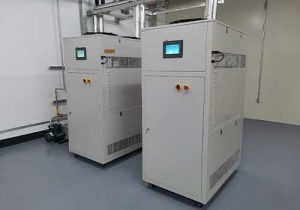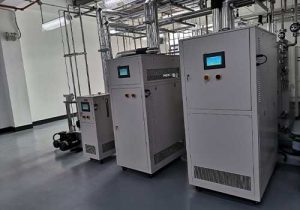liquid chiller unit
Introduction to Liquid Chiller Units
Liquid chiller units are an essential part of industrial cooling systems, designed to circulate a coolant through a heat exchanger to provide precise temperature control. These units are crucial in applications where maintaining a stable temperature is critical, such as in data centers, manufacturing processes, and research facilities.

Technology and Efficiency of Liquid Chiller Units
The technology behind liquid chiller units involves the use of a refrigeration cycle to transfer heat from the coolant to the environment, thereby cooling the system. The efficiency of these units is measured by their coefficient of performance (COP), which is the ratio of the cooling output to the energy input. High COP values indicate more efficient chiller units.
Applications of Liquid Chiller Units
Liquid chiller units are used in a variety of applications due to their ability to provide precise temperature control:
Data Centers: In data centers, liquid chiller units help maintain optimal operating temperatures for servers and other IT equipment, preventing overheating and ensuring reliable performance.
Manufacturing Processes: In industries such as pharmaceuticals and chemicals, liquid chiller units are used to control the temperature of processes, ensuring product quality and safety.

Research Facilities: Laboratories and research facilities often require precise temperature control for experiments and equipment, making liquid chiller units an essential component.
Sustainability and Energy Efficiency
The sustainability of liquid chiller units is increasingly important, with a focus on reducing energy consumption and environmental impact. By using advanced control systems and integrating with renewable energy sources, the performance of liquid chiller units can be optimized, leading to energy savings and reduced greenhouse gas emissions.
Advanced Control Systems
Advanced control systems, such as model predictive control (MPC), can optimize the operation of liquid chiller units by predicting and adjusting to changes in cooling demand. These systems can improve the efficiency and reliability of chiller units, reducing energy consumption and maintenance costs.

Integration with Renewable Energy Sources
Integrating liquid chiller units with renewable energy sources, such as solar or geothermal energy, can further enhance their sustainability and efficiency. This approach can reduce the reliance on fossil fuels and decrease the overall carbon footprint of the cooling system.
Conclusion
Liquid chiller units play a critical role in maintaining optimal temperatures in various industrial and commercial applications. As technology advances, the focus on energy efficiency and sustainability will continue to shape the development of liquid chiller units. By integrating advanced control systems and renewable energy sources, the performance and environmental impact of these units can be significantly improved, making them a key component in sustainable temperature management solutions.
Related recommendations
100 ton water chiller
325IntroductionIn the realm of large - scale cooling requirements, 100 - ton water chillers stand as indispensable workhorses. With a substantial cooling capacity equivalent to removing 1,200,000 Br...
View detailsMain Parameters for the Operation of Chiller Refrigeration System
1404Main Parameters for the Operation of Chiller Refrigeration System The operating parameters of industrial chillers have a great impact on the economy and safety of their work. In the refrigera...
View detailshot water bath equipment
376Introduction to Hot Water Bath EquipmentHot water bath equipment is a critical component in many scientific and industrial processes where temperature control is essential. These devices provide a...
View detailsCommonly Used Auxiliary Accessories for Industrial Chillers
1775Commonly Used Auxiliary Accessories for Industrial Chillers As a professional cooling equipment, in addition to the basic shell, the industrial chiller also has many auxiliary accessories. O...
View details
 LNEYA Chiller
LNEYA Chiller






HelloPlease log in